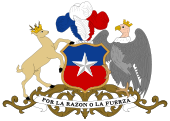Chilean political reform referendum, 1989
- Chilean political reform referendum, 1989
-
The 1989 Chilean referendum was a national plebiscite held on 30 July 1989 to reform the constitution. The amendments were approved by 91.25% of the votes.[citation needed] A total of 7,556,613 citizens voted.
If approved, 54 constitutional reforms were to be implemented, among which the reform of the way that the Constitution itself could be reformed, the restriction of state of emergency dispositions, the affirmation of political pluralism, the strengthening of constitutional rights as well as of the democratic principle and participation to the political life.
Thereafter, Aylwin won the December 1989 presidential election with 55,17% of the votes, against less than 30% for the right-wing candidate, Hernan Büchi, who had been Pinochet's Minister of Finances since 1985. Pinochet thus left the presidency on March 11, 1990 and transferred power to the new democratically elected president.
External links
Categories:
- Chile stubs
- South American election stubs
- Referendums in Chile
- 1989 referendums
- 1989 in Chile
- 1989 elections in South America
Wikimedia Foundation.
2010.
Look at other dictionaries:
Chilean referendum, 1989 — The 1989 Chilean referendum took place on 30 July, 1989, and opened up the way for the transition to democracy. The democratic reforms envisioned were approved by 91,25% of the Chilean people. 7,556,613 citizens voted.If approved, 54… … Wikipedia
Referendum — Part of the Politics series Elections Allotment (sortition) … Wikipedia
Chilean transition to democracy — History of Chile This article is part of a series Early History … Wikipedia
Revolutions of 1989 — Fall of Communism redirects here. For the fall of the Soviet Union, see Dissolution of the Soviet Union. Revolutions of 1989 Top left: Round Table in Warsaw. Top right: Fall of the Berlin Wall. Middle left: Romanian Revolution. Middle right:… … Wikipedia
Chile — Chilean, adj., n. /chil ee/; Sp. /chee le/, n. a republic in SW South America, on the Pacific Coast. 14,508,168; 286,396 sq. mi. (741,765 sq. km). Cap.: Santiago. * * * Chile Introduction Chile Background: A three year old Marxist government was… … Universalium
chile — /chil ee/, n. chili. * * * Chile Introduction Chile Background: A three year old Marxist government was overthrown in 1973 by a dictatorial military regime led by Augusto PINOCHET, who ruled until a freely elected president was installed in 1990 … Universalium
Spain — /spayn/, n. a kingdom in SW Europe. Including the Balearic and Canary islands, 39,244,195; 194,988 sq. mi. (505,019 sq. km). Cap.: Madrid. Spanish, España. * * * Spain Introduction Spain Background: Spain s powerful world empire of the 16th and… … Universalium
United Kingdom — a kingdom in NW Europe, consisting of Great Britain and Northern Ireland: formerly comprising Great Britain and Ireland 1801 1922. 58,610,182; 94,242 sq. mi. (244,100 sq. km). Cap.: London. Abbr.: U.K. Official name, United Kingdom of Great… … Universalium
international relations — a branch of political science dealing with the relations between nations. [1970 75] * * * Study of the relations of states with each other and with international organizations and certain subnational entities (e.g., bureaucracies and political… … Universalium
Military government of Chile (1973–1990) — History of Chile This article is part of a series Early History … Wikipedia

